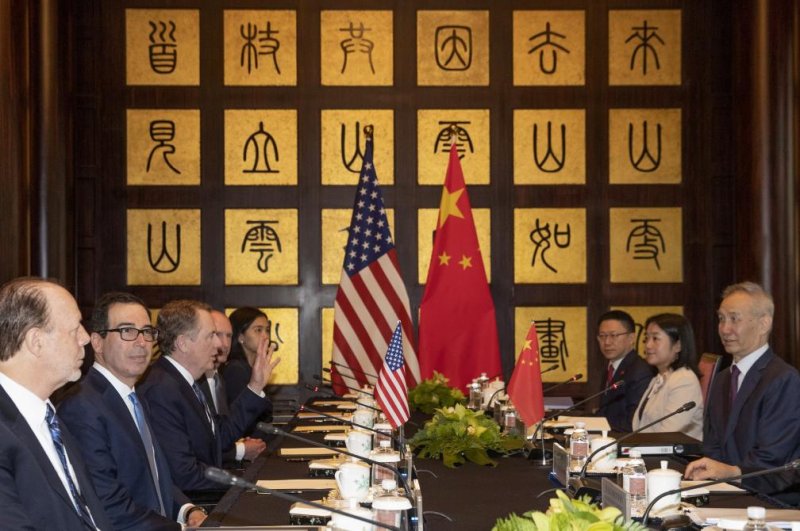Chinese Vice Premier Liu He (R), U.S. Trade Representative Robert Lighthizer (3-L) and Treasury Secretary Steve Mnuchin (2-L) prepare to hold talks at the Xijiao Conference Center in Shanghai on July 31. Photo by Ng Han Guan/EPA-EFE
NEW YORK, Aug. 28 (UPI) -- U.S. consumers could feel the sting of new tariffs on Chinese goods before Christmas as a prolonged trade war makes a recession more likely, U.S. analysts say.
Nicholas Lardy, senior fellow at the Peterson Institute for International Economics in Washington, told UPI it will be U.S. shoppers, and not the Chinese government, that will be paying for the tariffs.
The public has so far not paid for extra costs, as retailers have absorbed the brunt of the impact on the prices of intermediate goods, industrial parts and components. Households may not be prepared for the announced tariffs on consumer goods, which could soon equal $1,500 to $2,000 per family annually, Lardy said.
"Families still have to buy shoes for kids to go to school," said the analyst. "And 70 percent of shoes sold in the United States are made in China."
The Trump administration's latest round of 10 percent tariffs is to go into effect in two phases, on Sunday and Dec. 15. The approach is designed to mitigate any negative impact on the end-of-year holiday shopping season -- but the tariffs are likely to take a bigger toll on wallets.
"If everything announced goes into effect by Dec. 15, the benefits of the Trump tax cuts will be more than wiped out," Lardy said.
President Donald Trump has claimed China will pay for the tariffs, but consumer sentiment is sloping downward. In August, it hit its lowest point in 2019, according to the University of Michigan's Survey of Consumers.
The president has softened his tone on China since the G7 meeting in France -- calling Chinese President Xi Jinping a "great leader" three days after he referred to Xi as an "enemy." Trump has also said China has reached out to him by phone -- a claim Chinese officials did not confirm this week.
The president's flip-flopping on China in the past week is a familiar routine for Beijing, but his approach to bilateral relations could have serious consequences, says Kacie Miura, a research fellow at Harvard Kennedy School's Belfer Center for Science and International Affairs.
"China tends to treat foreign leaders who flip-flop, like Trump, with caution and restraint, but only while they are still new to office," Miura told UPI, citing research she has conducted jointly with U.S. political scientist Jessica Chen Weiss.
"Over time, however, if a foreign leader continues to flip-flop and adopts policies that harm China's interests, the Chinese government will abandon its initial restraint."
Lardy agrees China has so far shown moderation in the tariff wars. Beijing's counter-tariffs, for example, have never exceeded the penalties imposed by the United States.
"If you look carefully over the sequence of events over the last 15 months, the Chinese government has responded in a quite measured fashion to each of Trump's escalations," Lardy said. "They retaliate in a less than proportionate way than what Trump is doing."
China has yet to impose extra duties on U.S. exports like aircraft, semiconductors, Lardy said, but even as strategically important U.S. industries are not being targeted, the erosion of trust between the two countries poses risks.
Miura says the Chinese government is losing patience with the Trump administration and does not see the president as a reliable negotiating partner.
"Trump's mixed signals give the impression that he is starting to realize that the trade war is having serious consequences for the U.S. economy," Miura said. "This could lead the Chinese to believe that they have the stronger negotiating position."
The imposition of tariffs against China began as part of an effort to rein in the bilateral trade deficit with the world's second-largest economy -- a goal that has been replaced by other priorities.
"We began with the deficit, then U.S. Trade Representative Robert Lighthizer kept emphasizing intellectual property," Lardy said. "We got into a range of other issues."
The United States maintains a goods deficit with China. According to the most recent data from the U.S.-China Economic and Security Review Commission, the deficit reached $87 billion in the second quarter.
"The bilateral deficit has barely changed, about 10 percent," Lardy said. "The trade war imposes costs on both sides."
Tariffs are also not a solution to addressing larger structural issues in both countries, whether it is reform of state-owned enterprises in China or raising the savings and investment rates in the United States, where people spend more than they produce.
"Even if cosmetic fixes are enough to bring the trade war to an end, larger structural issues will remain a sticking point in the bilateral economic relationship," Miura said.















